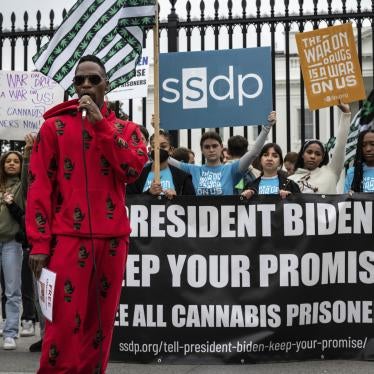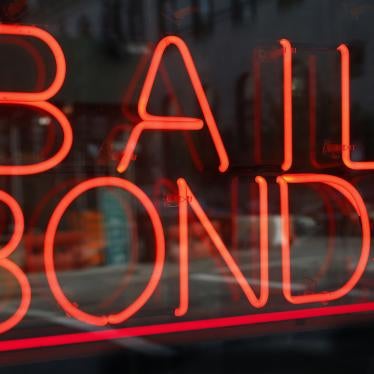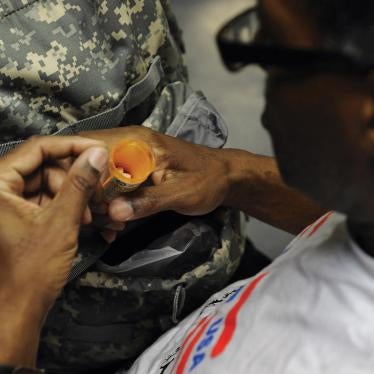November 4, 2022
The Hon. Joseph R. Biden, Jr.
President of the United States
The White House
1600 Pennsylvania Ave, NW
Washington, DC 20500
Dear President Biden:
We welcome your decision to pardon federal convictions for marijuana possession as a much needed first step toward mitigating the harm “war on drugs” and “war on crime” policies have imposed on Black and Brown families. However, as organizations working on racial justice, human rights, and immigrant rights issues, we are grimly disappointed at the explicit exclusion of many immigrants and at the absence of affirmative measures to ensure that all immigrants get meaningful relief from the immigration consequences that can follow marijuana convictions.
Cutting people out of criminal policy reforms simply because of their place of birth casts a shadow over the White House’s efforts to address the over-policing and mass incarceration of Black and Brown communities. Moving forward, we urge you to ensure that every step taken to remedy racial injustice includes relief to impacted immigrant communities. In particular, we urge you to extend protection to all immigrants, regardless of immigration status, and to take necessary steps to ensure that immigrants do not suffer negative immigration consequences from marijuana convictions.
You rooted the October 6th proclamation in the pursuit of racial equity, noting that “Black and brown people have been arrested, prosecuted, and convicted at disproportionate rates.” Yet you exclude Black and Brown immigrants facing the same structural racism as U.S. citizens. The announcement accompanying the proclamation also notes that pardons will relieve the collateral consequences resulting from marijuana-related convictions, including barriers to employment, housing, or educational opportunities.[1] Yet immigration detention and deportation are also consequences that flow from marijuana-related convictions, consequences left unaddressed by your proclamation.
The proclamation leaves immigrants behind in two primary ways. First, it applies only to people who are currently citizens or lawful permanent residents, casting aside undocumented immigrants and other lawfully present immigrants such as refugees and asylees.[2] Second, although full and unconditional pardons by the President should have the legal effect of removing the immigration consequences of marijuana possession convictions,[3] immigration prosecutors and judges will likely ignore the pardon’s effect in deportation proceedings.[4] These omissions mean that non-citizens will either be entirely ineligible for a pardon or may receive a pardon, but still face deportation as a consequence of the pardoned offense. The President should extend the pardon to all immigrants, and the administration should issue agency guidance that ensures immigrants previously deported or facing deportation because of a pardoned conviction receive appropriate relief.[5]
When pardons, clemencies, or sentence reduction measures do not address immigration consequences the ensuing harms are grievous. Deportation can be a death sentence for individuals who have fled or fear persecution in their country of birth; others face stigma and violence specifically aimed at people deported from the United States. Family members remaining in the United States after a loved one is deported often endure poverty, food and housing insecurity, and negative mental health outcomes.[6] There is also palpable injustice when the same government that delivers an act of clemency follows it with a penalty as harsh as deportation.
More than one year ago your administration announced the development of a pardon process focused on pursuing racial equity. Nearly 200 civil rights, immigration, and criminal justice organizations wrote to you following that announcement, emphasizing that immigration is a racial justice issue and urging you to include immigrants in the pardon process.[7] We reiterate that request today, and urge you to acknowledge that unjust laws that disparately impact Black and Brown communities are no more or less unjust depending on one’s citizenship status. As you stated on October 6th, no one should be in jail for marijuana possession. No one should be denied access to higher education or precluded from pursuing the career of their dreams because of marijuana possession. Surely no one should be deported and permanently exiled from their loved ones and community because of marijuana related convictions.
Thank you for your consideration. With questions, please contact Heidi Altman at haltman@heartlandalliance.org and Sirine Shebaya at sirine@nipnlg.org.
Sincerely,
ABISA
ACLU of New Jersey
African Communities Together
AIDS Alabama
AIDS United
Aldea - The People's Justice Center
Alternative Chance / Chans Altenativ
American Civil Liberties Union
American Friends Service Committee
American Gateways
American Immigration Lawyers Association
Asian Americans Advancing Justice - Asian Law Caucus
Asian Americans Advancing Justice - Atlanta
Asian Americans Advancing Justice | AAJC
ASISTA Immigration Assistance
Asylum Seeker Advocacy Project (ASAP)
Better Organizing to Win Legalization
Black Alliance for Just Immigration
Black and Brown United in Action
California Collaborative for Immigrant Justice (CCIJ)
California Immigrant Youth Justice Alliance
Cameroonian Community Of West Michigan (CACOWMI)
Capital Area Immigrants' Rights Coalition
CARECEN SF - Central American Resource Center of Northern California
Carolina Migrant Network
Center for Constitutional Rights
Center for Gender & Refugee Studies
Center for Law and Social Policy
Central Florida Jobs With Justice
Centro de Trabajadores Unidos
City of Atlanta Office of the Public Defender
Civil Rights Education and Enforcement Center
Colectiva Legal del Pueblo
Colorado Immigrant Rights Coalition
Colorado Jobs with Justice
Columbia Law School Immigrants' Rights Clinic
Communities United for Restorative Youth Justice
Communities United for Status & Protection (CUSP)
Community Asylum Seekers Project
Connecticut Shoreline Indivisible
Conversations with Friends
Detention Watch Network
Drug Policy Alliance
Envision Freedom Fund
Faith in New Jersey
Families for Freedom
Farmworker Association of Florida
Federal Public & Community Defenders
Florence Immigrant & Refugee Rights Project
Florida Immigrant Coalition (FLIC)
Freedom for Immigrants (FFI)
Freedom Network USA
Giselle Holloway
Grassroots Leadership
Haitian Bridge Alliance
Her Justice, Inc.
Hispanic Federation
Hope CommUnity Center
Human Rights Watch
Illinois Coalition for Immigrant and Refugee Rights
Immigrant Action Alliance
Immigrant and Non-Citizen Rights Clinic, CUNY School of Law
Immigrant ARC
Immigrant Defenders Law Center
Immigrant Defense Project
Immigrant Justice Network
Immigrant Legal Advocacy Project
Immigrant Legal Defense
Immigrant Legal Resource Center
Immigration Hub
Inter-Faith Committee on Latin America
Jewish Activists for Immigration Justice
JUNTOS Philadelphia
Just Futures Law
Justice Action Center
Justice Strategies
La Resistencia
Legal Aid Justice Center
Louisiana Advocates for Immigrants in Detention (LA-Aid)
Louisiana Organization for Refugees and Immigrates
The Leadership Conference on Civil and Human Rights
Make the Road New York
Mariposa Legal, program of COMMON Foundation
Migrant Center for Human Rights
MomsRising/MamásConPoder
Monsoon Asians & Pacific Islanders in Solidarity
Muslim Advocates
NASTAD
National Association of Criminal Defense Lawyers
National Day Laborer Organizing Network (NDLON)
National Immigrant Justice Center
National Immigration Law Center
National Immigration Project (NIPNLG)
National Korean American Service & Education Consortium (NAKASEC)
National Network for Immigrant and Refugee Rights
National Organization for the Reform of Marijuana Laws
NETWORK Lobby for Catholic Social Justice
New York Immigration Coalition
NorCal Resist
North Carolina Justice Center
Northwest Immigrant Rights Project
NYU Immigrant Rights Clinic
Ohio Immigrant Alliance
Parabola Center for Law and Policy
Public Defenders Coalition for Immigrant Justice
RAICES
RCHP-AHC Still Waters Anti-trafficking Program
Respond Crisis Translation
Robert F. Kennedy Human Rights
Rocky Mountain Immigrant Advocacy Network
Rural Organizing Project
SEIU Florida Public Services Union
South Asian Americans Leading Together (SAALT)
Southeast Asia Resource Action Center
Southern Poverty Law Center Action Fund
Still Waters Anti-trafficking Program
StoptheDrugWar.org
Students for Sensible Drug Policy
Sunita Jain Anti-Trafficking Initiative
TASSC (Torture Abolition & Survivors' Support Coalition) International
The Bronx Defenders
The Legal Aid Society (New York)
The Sentencing Project
The Unitarian Universalist Association
Transformations CDC
UCLA Center for Immigration Law and Policy
UCLA Law Criminal Defense Clinic
UnLocal
Vera Institute of Justice
Veterans Cannabis Coalition
Washington Office on Latin America (WOLA)
Washington Statewide Reentry Council
Wind of the Spirit Immigrant Resource Center
Women's Refugee Commission
[1] White House Briefing Room, Statement from President Biden on Marijuana Reform, Oct. 6, 2022.
[2] White House Briefing Room, A Proclamation on Granting Pardon for the Offense of Simple Possession of Marijuana, Oct. 6, 2022.
[3] See Jason Cade, The Immigration Implications of Presidential Pot Pardons, https://papers.ssrn.com/sol3/papers.cfm?abstract_id=4255925.
[4] 8 U.S.C. § 1227(a)(2)(A)(vi) provides a list of removal grounds that may be waived in the case of a presidential or gubernatorial pardon. Because the controlled-substance ground is not included in this list, the Board of Immigration Appeals and some federal courts have ruled that pardons by state governors for drug-related offenses will not prevent immigration consequences.
[5] Many immigrants previously deported because of a pardoned conviction or facing removal on the basis of a pardoned conviction will require a positive exercise of discretion by the Department of Homeland Security (DHS) to ensure they are able to access relief. For individuals already deported on the basis of a marijuana related pardoned conviction, DHS can mitigate the immigration consequences by joining in the individual’s motion to reopen their proceeding and stipulating to termination of proceedings or a grant of relief from removal. For individuals currently in the United States facing removal proceedings or at risk of facing removal proceedings on the basis of a vacated conviction, numerous options are available to DHS to ensure protection for deportation including stipulating to the individual’s relief or providing protection from deportation in the form of Deferred Action.
[6] Soc’y Cmty. Research & Action Div. of the Am. Psychological Ass’n, Statement on the Effects of Deportation and Forced Separation on Immigrants, Their Families, and Communities, 62 Am. J. Community Psychol. 3, 3-12 (2018); Facing Our Future: Children in the Aftermath of Immigration Enforcement, Urb. Inst. (Feb. 2010).
[7] National Immigration Project of the National Lawyers Guild, Civil Rights Groups Call on President Biden to Include Immigrants in Pardon Process, June 2, 2021.








